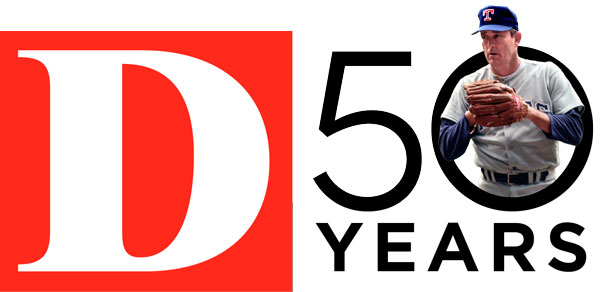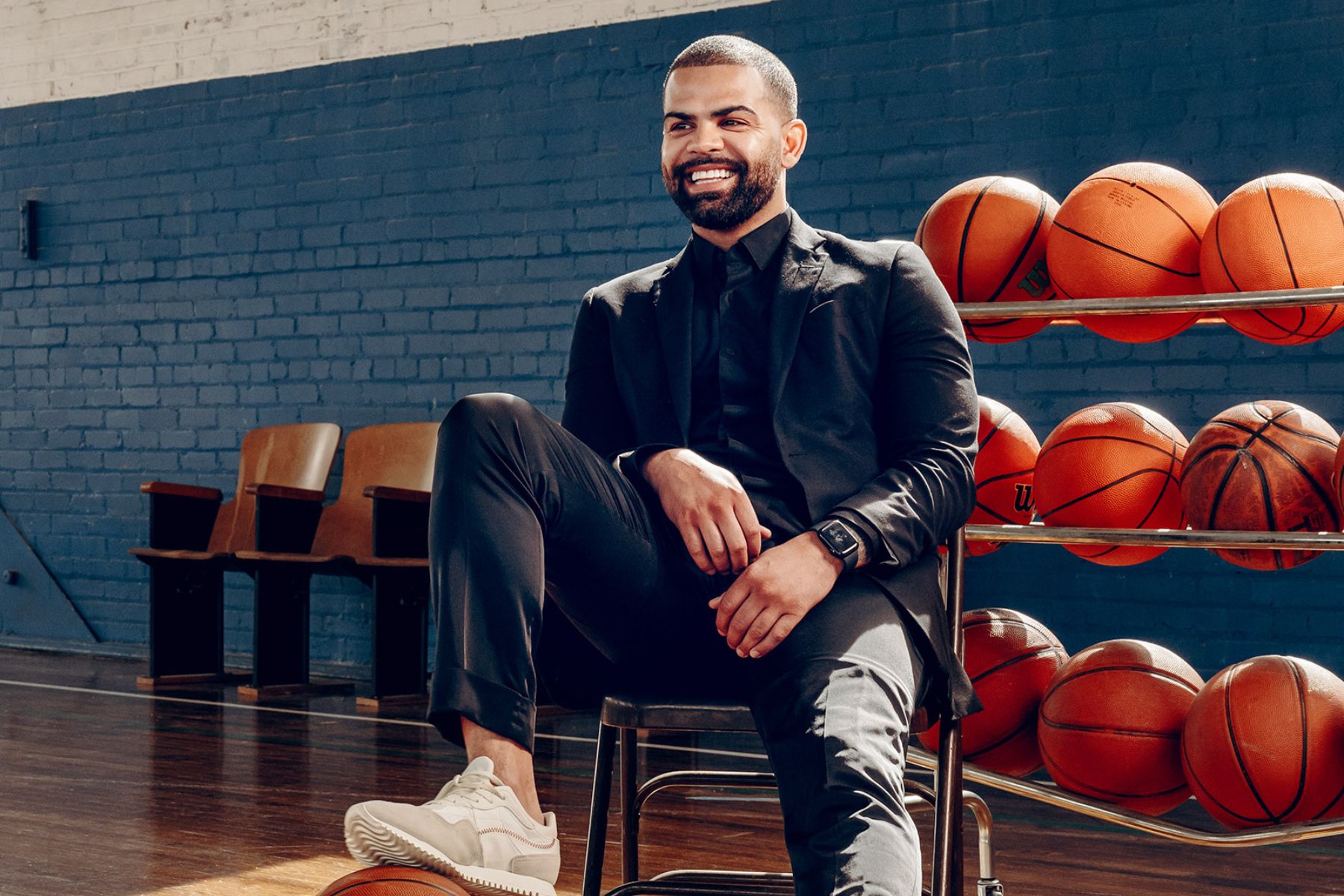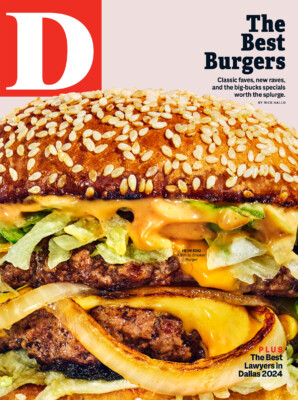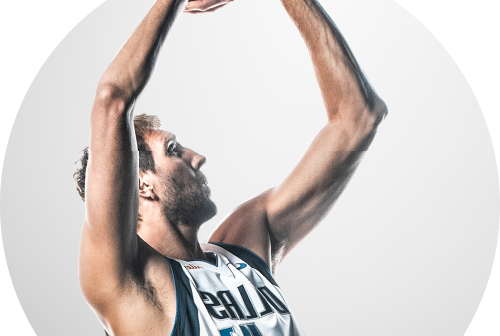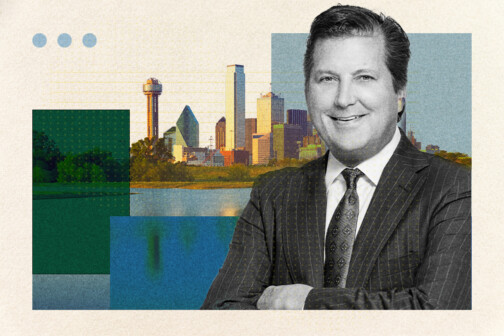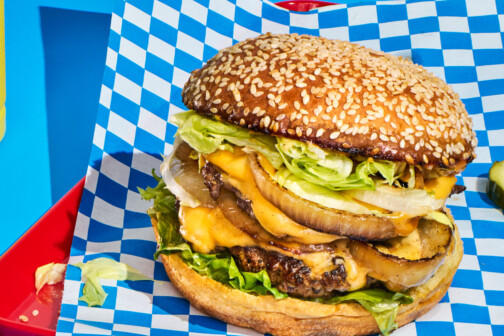Tim Martin is ready to leave the high-rise behind, the swanky one in Deep Ellum with an espresso machine and complimentary dog treats in the lobby. He has called it home for three years, but he’s a country boy at heart, the kind of dude who drives an F-150 and will sing Alan Jackson’s “Crazy ’Bout a Ford Truck” jingle from the ’90s if you ask him why. If that scans as unusual for a basketball coach who profiles as a cross between Drake and Tony Parker, with his coal-black scruff and razor-tight haircut, consider this but one of the many ways the 37-year-old defies convention and constraints.
He’s eyeing acreage out in Pilot Point, maybe West Fort Worth. The high-rise has served its purpose, which went beyond the amenities. He points to an upper unit toward the southeast corner, the one he chose when he moved into the building. He picked it for the view across I-30, where he could see the apartment building he was evicted from because he couldn’t pay the rent. That was a dozen years ago, and he made a promise then that endured through two years of homelessness, all the way to becoming one of the most renowned trainers in basketball. “I had to prove to myself I could get my life back,” he says, and that means being here, where he was told he couldn’t be.
He explains all of this with the fanfare of an announcement being read over a high school PA system. The least dramatic retelling of Tim Martin’s story comes from Martin himself, in his matter-of-fact delivery just a few doors down from gruff, the faintest hint of twang surfacing on the right vowel. The details do the heavy lifting on their own: a latchkey kid who attended 11 schools in 12 years hustles his way from sleeping in his car into tutoring the most tantalizing prospect the NBA has seen in 20 years, plus running an icon’s shoe line on the side.
Martin got his life back and then some. He can move on now.

Q2
Martin falls in love with basketball under the desert sun, marveling at how the dust clouds puff and the pebbles scatter when the ball hits the ground, the way the net ripples with the wind. He is only in second grade, but he can entertain himself for an hour uninterrupted like this, studying and calibrating each action and reaction, the control he has over his environment. He doesn’t have much otherwise, not with how often he and his mother, Vanessa—and later his stepfather and half-siblings—stay on the move. He was born in Arlington, and from there it’s off to Arizona, Colorado, California, Hawaii, and ultimately Rio Rancho, New Mexico: anywhere and everywhere Vanessa goes in search of the next adventure. Years later, he’d tell her that this is the dominant piece of his childhood he wished were different—not the poverty, or not knowing his father, but how he feels rooted to nothing, a biracial kid always just passing through.
But he learns to adapt. He learns that Vanessa’s all-purpose mantra—“It’s gonna be fine”—turns out to be true more often than not. He learns to people-watch, from the Apache in a nearby pueblo to old-timers at Luby’s when the family goes out to dinner. And he learns that no matter what else he’s forced to leave behind, the ball always travels with him.
So he devotes himself to it. He is a serious child—intense, even. The one who helps keep Vanessa organized, whose high school teachers inform her that he’s all or nothing in everything he does. “We thought maybe he would come up to be a judge,” she says. Except all Martin wants is to be a basketball player, and so he’s in the gym early, in the gym late, in the gym when his teammates don’t want to be. He’s a point guard, the player who sees the floor and manipulates the play, through his mind and that handle he cultivated through all those hours dribbling on dirt and rocks. The captain, too, not that the title appropriately conveys his gravitas, how one minute he’s calling timeouts on the fly and the next he’s instructing the big men on how to set screens. Martin’s teammates nickname him “Coach.”
Pepperdine University takes notice; they consider bringing him in on scholarship. But it falls through, and his ACT score isn’t up to snuff anyway, so he’s off to play for New Mexico Junior College instead. Then he’s not even doing that, after tearing a ligament in his ankle playing in a summer streetball tournament before even showing up on campus. He tries to come back in fall practice, but he re-injures the ankle and knows he’ll never be the same. His playing career is over.
What do you do when your purpose disappears? Martin has no idea beyond knowing he won’t find whatever comes next by looking backward. He asks his father, Rodney—whom he met for the first time at his high school graduation—if he can stay with him in Dallas. He needs to see the other side of where he comes from. He knows his father ran adjacent to hip-hop royalty, once managing the likes of Tupac Shakur, OutKast, and The D.O.C. Soon he finds out they’re related to basketball royalty, too: the Sassers, the first family of Dallas basketball. Martin may have grown up outside their shadow, but he’s aware that Jason Sasser was a Mr. Basketball at Kimball High School before becoming Southwest Conference Player of the Year at Texas Tech, that Jason’s little brother, Jeryl, left SMU as the program’s all-time leading scorer and a first-round draft pick of the Orlando Magic. Martin is done with basketball, though. He enrolls in barber school because he likes the thought of doing something that makes people feel good about themselves and because he doesn’t have any better ideas.
Then his cousin, Fred Campbell, asks him to help coach for the day. Campbell has been privately coaching kids out in Colleyville, and he needs someone to rebound for him. Martin tags along and sees his cousin pocket $160 for two hours of his time. Campbell hands him a quarter of it, and they spend it on happy hour at TGI Friday’s. Martin can’t believe it. You get paid to make kids better at basketball? You set your own hours, too? And some of them pay upfront? And there are four more clients lined up tomorrow?
“I just saw that as, Wow, this is the life I want to live,” he says. “That was a pivotal moment where I just knew I could do this.”
He starts showing up wherever Campbell will have him, and a funny thing happens: the kids listen to him. Not only that, some of the parts he enjoys most have nothing to do with basketball, the way they want to tell him all about their lives. School. Home. Girls. Maybe he can’t be a point guard again, but he can be Coach—a teacher and a mentor, someone who matters to people. Within a month, he has his first solo client, a first grader who can’t dribble and damn sure can’t shoot, but who improves little by little each week. Martin pockets $20 a session, and it may as well be a million for the way those Saturday mornings make him feel. His dad has a mantra, too. “You’ve got to want something,” he tells his son. For the first time since his ankle gave out, Martin does.
His client brings a friend one day, and word travels. Martin takes whoever can pay him—neither his bankroll nor his résumé can afford to be picky—but he scores his first coup working the valet stand at Carson’s Live, a nightclub his dad runs just off the Dallas North Tollway, in Far North Dallas. Show up on the right night, and you might see Dallas Cowboys superstar Terrell Owens hanging around. Some Dallas Mavericks, too. Martin eventually works up the nerve to approach All-Star forward Josh Howard and ask if he needs anyone to work his summer basketball camp. Martin gets the gig and takes it seriously. He shows up, does what he’s told, follows it to the letter. One day Howard’s trainer doesn’t show up, which is how Martin finds himself rebounding for Dirk Nowitzki’s running mate. A relationship forms, and before long Martin is the one training Howard, and then guard Devin Harris, who will go on to do three stints with the Mavericks.
It sounds crazy, this 22-year-old kid from nowhere, whose career stalled out in junior college, offering advice to NBA players. For that matter, it sounds crazy that NBA players feel compelled to look outside their organizations at all, given the head coaches making seven figures and the battalions of assistants to support them. But basketball is changing in 2009, and Martin is in the right place at the right time. A new generation of players has learned from the example Michael Jordan set a decade earlier, when he hired Tim Grover to mold his physique and his mind year-round, and to do so away from the prying eyes of his employer.
Grover is a body sculptor far more than a game developer, though, which creates a market for a different branch of private trainer, someone who approaches the job the way a golf coach scrutinizes a backswing or his tennis counterpart fixates on a forehand. NBA coaches have far too much on their plates scouting their next opponents and maintaining harmony in the locker room to bother with tightening each player’s handle or follow-through, presuming they have the biomechanical knowledge to do so in the first place. They are masters of the macro. Skills trainers are there to polish the micro. Need your jumper fixed? Want film cutups of your every possession in last night’s game with detailed feedback? How about a pep talk after shootaround on game day? Or somewhere to work out in the offseason with a regimen covering each week? Cut a big enough check, and a skills trainer can deliver all of it.
“Most of these [head coaches] are dealing with basic math,” says David Thorpe, who helped pioneer the profession in 1993. “I would say Tim [Martin] and I probably are trying to deal mostly with calculus, which is very different world.”
Tim Martin, though? The guy from the valet stand? Yes, Harris says, because it just so happens that he and Howard keep getting better the more they work with him. Hang around the game long enough, and you’ll find plenty of teachers whose game belies their frame; Lawrence Frank, Harris’ head coach the year he was named an All-Star with the Nets, got his start as the manager of his college basketball team. A small number of people are blessed with the ability to see the game at its molecular level—each sliver of space, how every footfall begets the next. Only an even smaller number of that group can communicate that information to someone else.
“And then to be able to relay that verbally as well as physically—not a lot of people can do that,” Harris says. “Some people can show you, but they can’t translate it to where you understand that. Tim can.”
But what Martin understands best is “it’s never really about the basketball. That’s actually only a small percentage of it.” He’s learning “10,000 ways to say the same thing,” which means connecting with the person before the player, internalizing what they care about and how he can care, too.
“A lot of these trainers are as deep as a puddle,” says Mike Procopio, a former director of player development for the Mavs. It’s a differentiator that Martin can share stories about breaking horses in Colorado and meeting the Apache in New Mexico, how he’s fascinated by psychology and sociology and astrology, all of which he eventually incorporates into his training. He’s got a pop culture reference for everything. Working with big men, for instance, makes him feel like he’s in Big Hero 6, an animated film about a boy and a giant robot. In conversation, he stays curious without prying, is charismatic but never obnoxious. He can connect. And because he connects, he improves, too. He grows.
Problem is, his bank account isn’t growing with him.

Q3
Three years pass, and Martin isn’t much wiser about how much to charge or what a business plan looks like, how to diversify revenue or what channels market his work best. His roster of NBA clients is outnumbered by the school-aged crowd, which means most weeks he’s making just 60 bucks a day from basketball, sometimes 80. That’s hardly enough to quit his day job, which rotates between retail, security, and working the front desk at Motel 6. And he’s a father now, to a boy named Christian; he’s 2 years old and has Martin’s hands, right down to the crooked pinkies.
Martin is making it work until he and Christian’s mom split up in 2012, and that’s when the hard times come. He loses his latest job, a seasonal gig at UPS. Then he’s kicked out of the apartment overlooking I-30. He starts sleeping in his car, a Mercury Milan he doesn’t bother pretending he can afford the payments on. He changes parking spots every day because you can’t repossess a vehicle you can’t find. Weekday mornings begin at the Farmers Branch Community Recreation Center, where he showers and shaves right when it opens at 6 am and then slinks back out in hopes of no one noticing him. If he’s got a client, then it’s off to the gym, where the kids he trains are none the wiser about how he can fit most everything he owns in two trash bags. If he doesn’t, he’s likely in the lobby of a chain hotel because personal experience has taught him that no one answering phones questions people who act like they belong. He grabs a bagel or a yogurt from the continental breakfast spread and camps out in the business center, usually browsing job listings on Indeed.com. Sometimes he’s so desperate for direction that all he can bring himself to do is open a search engine and type queries like “how to be successful” or “how to be happy.”
A good week’s pay lets him scrounge together a week at a motel, or at least enough of the rate that Martin can make up the rest by helping the housekeeping staff with laundry and cleaning rooms. Those are the times when he tries to have Christian with him, to feign some sense of order, to feel like he can provide at least a little bit. No one else knows about any of it.
Half a year of living that way isn’t enough to make him forget his mother’s mantra, that everything’s gonna be fine. He wills himself to believe that, but it isn’t fine. Nothing is. How could it be fine when he’s wedged in the back seat of the Mercury with Christian asleep on his chest, staring at the roof, trying so hard not to wake the boy with the shifting of his body weight, or his sobs? He feels all alone. He feels like a failure.
But there’s a second half to that mantra: “It’s gonna be fine—because we’re gonna make it fine.” And in the backseat of that car, at the lowest point of his life, it starts to sink in.
“Something just clicked where it’s like, well, it can’t get any worse. So what can you do about it?” he says. “Well, shit, I already have some kind of momentum. I’m already working with some kids. Let me just work that much harder and really dedicate myself to getting out of the situation.”
So Martin pops by SMU, where Larry Brown, the only head coach to win championships in the NBA and NCAA, is running the Mustangs. He asks for five minutes of Brown’s time to talk ball, because what’s one more rejection? When the legend stuns him by saying yes, Martin returns for five more minutes, then five more after that, until he’s sewing together the Hall of Fame coach’s threads of wisdom about psychology and ball screens and cuts to the basket. He spends a season as an assistant at Greenhill, where the head coach, a math teacher named Jaye Andrews, was once roommates with Jay Wright, perhaps the best coach in college hoops, then at Villanova. Martin gets a one-way ticket to Philadelphia, camps out at Villanova practices, charms his way into picking Wright’s brain, too, and reconnects him with Andrews back in Dallas for good measure. He doesn’t have a reason to be at the 2013 NBA All-Star Weekend in Houston, and probably not the money, either. Neither stops him from booking a room at a Super 8 and showing up to every event he can to shake hands and collect phone numbers. Once he’s back in Dallas, he texts a new person at random each week to see how they are and if there’s anything he can do to help them.
There are setbacks. The Mercury finally gets repossessed. He starts crashing on a friend’s couch, a brown loveseat that Martin will sleep on for the next 18 months, long enough that his back hasn’t been right since. Still, he presses on. He starts working summer basketball camps run by John Lucas, a head coach for three NBA franchises and an assistant for three more, and Lucas is so impressed by Martin’s consistency that he schools him on his four pillars of coaching: mentorship, counseling, education, and positive confrontation. Martin learns to barter, trading free lessons for a break on gym fees as his client roster slowly expands.
“You throw him on a desert island and by the time you go there three months later, there’ll be condos and a casino,” says Procopio, the former director of player personnel for the Mavs, who now works with him. “The guy finds a way to make things out of nothing.”
Until, abruptly, he doesn’t have to anymore. He catches a break in Keller, landing a gig coaching a grade school team for $600 a month. Unwittingly he becomes a source of fascination to one of the parents, an investment banker named Glen Mastey. Mastey can’t, as he puts it, “square the corners” on how someone this knowledgeable, this engaging, could be scraping along at the margins. “The day he walked into the first practice, I think the kids were in complete awe of him, and so were the parents,” Mastey says. But Mastey understands what poverty does to a man because he grew up poor on the East Coast and knows how many avenues are sealed off to a person without money. But he figured out how to walk them anyway, and now he has the means to help someone else do the same. When Martin tells him he’s mulling over giving up coaching for good to go back to working security because he’s closer to 30 than 20 and can’t sleep on a loveseat for the rest of his life, Mastey frets to his wife about all that lost potential if they don’t intervene.
“Honey, we cannot allow this to happen,” he tells her. “He’s going to be great one day. And when he’s great, he’s the type of guy that appreciates all the hardship.”
Mastey buys Martin a laptop. Helps him craft a business plan. Hands him some walking-around money. Co-signs on an apartment, a one-bedroom in Lewisville that to Martin may as well be a mansion, especially the first time he sleeps in a bed of his own in two years. “A foundation,” Mastey calls it, but he doesn’t know the half of how solid it actually is.
“I’m sure everybody can attest to that one person that just believed in you and just made you feel a certain type of way about yourself,” Martin says, “to where it’s like, ‘You know what? Maybe I can do this.’ ”
Now it’s on him to build on it.
Q4
He finds the cornerstone at his cousins’ old stomping grounds, Kimball High School, and it comes by way of Greenville, South Carolina. Jawun Evans is savvy and sprightly and a holy terror with the ball in his hands, which makes him the ideal pupil for everything Martin has cobbled together. “My guinea pig,” he affectionately calls him. Larry Brown, John Lucas, Devin Harris and Josh Howard, Rio Rancho High School: you can see a bit of all of it in how Evans dices up the best talent Texas has to offer on the pick-and-roll. Martin believes in Evans so much that he doesn’t make a dime training him, because Evans doesn’t have any more of them than he does. But that hardly matters. This is going somewhere big. They film the whole process, from Kimball up to the Los Angeles Clippers, whom he joined in 2017. The resulting short film is called The Beautiful Struggle, three words Martin builds a brand from, bordering on an identity, because Mastey is dead on about his capacity to turn pain into progress.
The higher Evans rises, the more calls roll in from other high school point guards eager to download everything Martin taught him. One of them starts making the drive down from Norman, Oklahoma, a wisp of a kid with hair like cotton candy and the slightest peach fuzz on his upper lip. “That kid is going to make it,” Martin tells his dad. Rodney can scarcely believe that among the specimens in the building, Trae Young is the prospect Martin is certain about, but hell if he isn’t right. Young blossoms into a college hoops sensation at Oklahoma, then a top-five NBA draft pick and a three-time All-Star with the Atlanta Hawks.
Next comes Tyrese Maxey from South Garland, who plays Harris one-on-one when the former is in high school and the latter has more than a dozen seasons under his belt. The kid goes at the vet with such ferocity that Harris couldn’t be less surprised when Maxey goes on to star for the Philadelphia 76ers. The NBA takes note. Players at other positions flock to Martin, too. P.J. Washington, traded to the Mavericks this season, started working with him during his eighth grade year in Frisco. Euless Trinity product Myles Turner becomes a mainstay during his summers back in North Texas. Rudy Gobert, basketball’s most intimidating defender, signs on upon the recommendation of his agency. Evans’ success opens up a pipeline back in South Carolina, and Martin begins making regular trips to South Carolina to train the next crop of NBA talent from the Palmetto State.
Requests start coming in to hold camps overseas, from Cameroon and France to South Korea and China. The latter puts him on the radar of Li-Ning, a Chinese apparel and sportswear company whose face is Dwyane Wade, the Dallas Mavericks’ nemesis and future Hall of Famer. Li-Ning needs a service rep in the United States for the Way of Wade brand, and they hear Martin has his share of friends scattered around the hoops world. Wade would like to speak with him about the job, so Martin puts on a suit and meets him at a steakhouse in Chicago—“Nervous as hell,” he admits—and tells him the truth: “I don’t have a degree in marketing. I’m not a guru in this field. But I know how to get you answers.” He’s hired, and after easing one pain point after another, he winds up running Wade’s whole line. Then he’s running with Wade himself, which to Procopio is just about the most Tim Martin thing in the world.
“Like a city version of Forrest Gump,” he says, a noticeable lilt in his voice. “Here’s Tim, a guy who was sleeping in his car, now in the inner circle of D-Wade when he’s getting inducted into the Hall of Fame.”
It’s bizarre to Martin, too, how time has transported him here. His parents worry that the same man who wanted for one job a decade ago now spreads himself too thin, that being an internationally renowned trainer and a budding shoe mogul and a world traveler and a dad will strain anyone, much less someone who remains all or nothing about everything. Indeed, Martin is turning down far more clients than he takes now, and whoever makes the cut must match his energy and curiosity because “at this stage of my career, I’m big on synergy.”
He’s assured that won’t be a problem with the French prodigy, the one whose YouTube highlights border on paranormal. His name is Victor Wembanyama, and he is unprecedented: a 7-foot-4 teenager from the Paris suburbs who moves like an antelope with a giraffe’s dimensions, somehow gawky and graceful at the same time. Wembanyama is destined to break basketball, maybe more so than anyone since LeBron James, and whoever is along for the ride stands to gain plenty from it. Martin knows all of that when Wembanyama’s agency pitches him on the idea of training the big French kid in February 2020, three years before he’ll become the no-brainer top overall pick in the 2023 NBA draft.
What he wants to know is whether Wembanyama will make his bed. Seems silly, he’s aware, but Martin picked up the test from a book written by former Navy SEAL William H. McRaven for a reason, because “if you’re trying to go to the NBA and you’re trying to get to the next level, if you can’t commit to doing the smallest task in the morning time, then what are we really talking about?” He wants to know what piques Wembanyama’s curiosity, what he’s most eager to learn, about his passions away from basketball, which range from art to opera to Game of Thrones. But most of all, he wants to know what Wembanyama wants.
“I just want to be the greatest person that I can be—not for everybody else, not even about basketball,” Wembanyama tells him over Zoom, because the pandemic has just gotten underway.
“I don’t hear that often, let alone from a 15-year-old,” Martin thinks to himself.
He decides they can learn from each other, even if video calls in quarantine make for an awkward classroom environment. Thank goodness Martin’s new place in The Colony has a yard, where he sets up Christian’s Little Tikes basketball hoop and maps out that day’s footwork or movements. Wembanyama’s parents hold up the camera and Martin watches his pupil’s attempt to mirror it, dispensing praise and corrections through the kid’s AirPods. Martin likes that Wembanyama is a task-driven Capricorn—“If I tell him to make three straight 3s from the corner, he won’t move from that spot until he does”—and that his sensibilities skew low-key. When the borders open and they can train in person, they intersperse workouts with museum trips and ditch restaurant dining for home-cooked meals. It gets harder and harder to maintain that normalcy as the inevitable has come to pass: Wembanyama being drafted first overall by the San Antonio Spurs, melting generations-old guardrails keeping a big man in a particular lane, becoming an American commodity before he can legally drink his first American beer.
Martin is caught in those tailwinds, too. “This is your Tupac,” his father tells him, hearkening back to his music career, when one household name catapulted him higher and faster than everything before it put together. Now Martin is being interviewed by the Washington Post, has TV producers asking to do a segment on him. It’s not his style to usher that process along.
“He doesn’t need a ‘back-iotomy’ because you’ve got to pick up all the names he drops,” Procopio quips.
But if it’s going to happen, he may as well marshal it toward taking him all the places he plans to go. He wants to become basketball’s Jay-Z, someone who stretches the circumference of his chosen field wide enough to envelop whatever else he’d like to dabble in. He’s already launched a coaching app, and he wants to win the Sundance Film Festival, hopefully through telling the story of Andrew Jones, a longtime client who beat leukemia while playing for the Texas Longhorns. What about an Anthony Bourdain-style international docuseries, with basketball standing in for food? Then there’s the big one: a wellness center for athletes, 100 acres somewhere far from skyscrapers and traffic lights, where “you’re not just working on basketball, but you’re working on your mind-body-soul kind of thing.”
That last one’s years away, Martin muses. He’s in a room off the lobby of his building, a stone’s throw from the espresso machine. He’s two hours into breaking down film and pounding out correspondence. One minute he’s sending cutups and feedback to Bilal Coulibaly, the seventh pick in the 2023 NBA draft and Wembanyama teammate in their France days. Then he’s replying to an email from Li-Ning about an upcoming activation.
A red neon sign illuminates his table from the opposite wall. “You Are Exactly Where You Need To Be,” it reads in flowy cursive. Tim Martin has worked hard to get here. It would be unwise to bet against him getting exactly where he needs to go next.
This story originally appeared in the May issue of D Magazine with the headline “The Hoops Whisperer.” Write to [email protected].
Author

